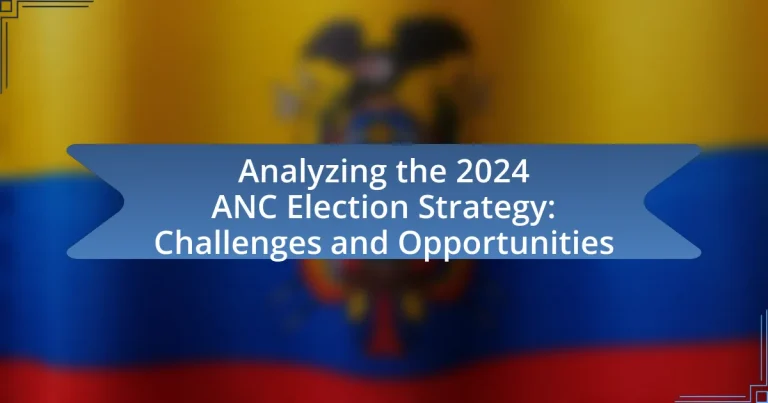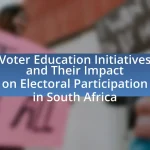The main entity of the article is the African National Congress (ANC) and its strategy for the 2024 elections. The article provides a detailed analysis of the ANC’s election strategy, highlighting key components such as grassroots mobilization, economic policy focus, service delivery improvements, and digital outreach. It discusses the party’s engagement methods with voters, the challenges it faces, including declining public perception and internal divisions, and the opportunities available to regain support. Additionally, the article examines the role of social media, public sentiment, and economic conditions in shaping voter behavior and the ANC’s electoral prospects.
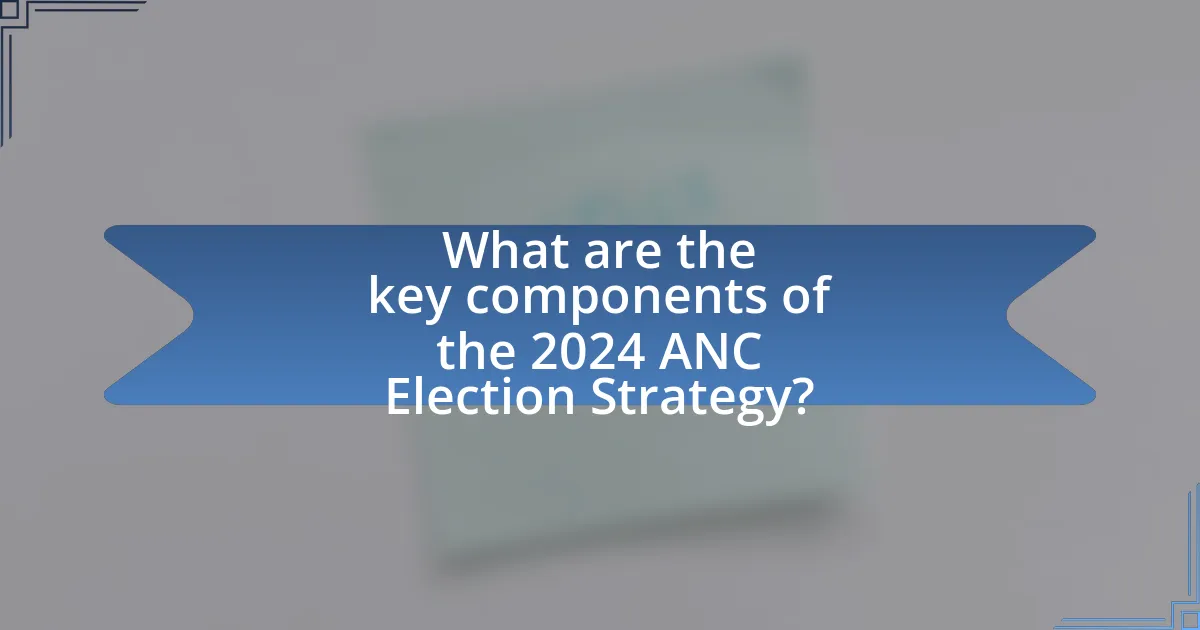
What are the key components of the 2024 ANC Election Strategy?
The key components of the 2024 ANC Election Strategy include a focus on grassroots mobilization, addressing economic challenges, enhancing service delivery, and leveraging digital platforms for outreach. Grassroots mobilization aims to engage local communities and strengthen support at the base level, which is crucial for voter turnout. Addressing economic challenges involves presenting clear policies to tackle unemployment and poverty, which are significant concerns for voters. Enhancing service delivery focuses on improving public services to regain trust among constituents. Finally, leveraging digital platforms allows the ANC to reach a broader audience, particularly younger voters, through targeted campaigns and social media engagement. These components are designed to create a comprehensive approach to winning the election amidst various challenges.
How does the ANC plan to engage with voters in 2024?
The ANC plans to engage with voters in 2024 through a comprehensive campaign strategy that includes door-to-door canvassing, community meetings, and digital outreach. This approach aims to foster direct communication with constituents, allowing the party to address voter concerns and promote its policies effectively. The ANC has historically utilized grassroots mobilization techniques, which have proven successful in previous elections, to build rapport and trust within communities. Additionally, the party is leveraging social media platforms to reach younger voters, reflecting a shift towards modern campaigning methods that resonate with a tech-savvy electorate.
What methods will be used for voter outreach and mobilization?
The methods used for voter outreach and mobilization will include targeted digital campaigns, community engagement initiatives, and grassroots organizing efforts. Targeted digital campaigns will leverage social media platforms to reach specific demographics, utilizing data analytics to tailor messages effectively. Community engagement initiatives will involve organizing local events and forums to foster direct interaction between candidates and voters, enhancing personal connections. Grassroots organizing efforts will focus on mobilizing volunteers to canvass neighborhoods, distribute informational materials, and encourage voter registration, which has been shown to increase turnout rates significantly in previous elections.
How will social media play a role in the ANC’s strategy?
Social media will be integral to the ANC’s strategy by enhancing voter engagement and mobilization efforts. The ANC plans to utilize platforms like Twitter, Facebook, and Instagram to disseminate information, counter misinformation, and connect with younger voters, who predominantly use these channels. Historical data shows that social media campaigns significantly influenced voter turnout in previous elections, with a 2019 study indicating that 60% of South African voters aged 18-34 relied on social media for political information. This trend underscores the importance of a robust social media presence for the ANC to effectively communicate its policies and rally support ahead of the 2024 elections.
What are the main objectives of the ANC for the 2024 elections?
The main objectives of the African National Congress (ANC) for the 2024 elections include strengthening economic recovery, addressing unemployment, and improving service delivery. The ANC aims to implement policies that promote job creation and economic growth, particularly in sectors heavily impacted by the COVID-19 pandemic. Additionally, the party focuses on enhancing governance and accountability to restore public trust. These objectives are supported by the ANC’s commitment to the National Development Plan, which outlines strategies for sustainable development and social cohesion.
How does the ANC define success in the 2024 elections?
The African National Congress (ANC) defines success in the 2024 elections primarily as achieving a majority in the National Assembly to maintain its governing power. This objective is rooted in the party’s historical significance and its commitment to advancing socio-economic development in South Africa. The ANC aims to secure at least 50% of the vote, reflecting its ability to address pressing issues such as unemployment, inequality, and service delivery, which are critical to voter concerns. The party’s performance in previous elections, where it garnered 57% of the vote in 2019, serves as a benchmark for its success criteria in 2024.
What specific policies will the ANC focus on during the campaign?
The African National Congress (ANC) will focus on policies addressing economic recovery, job creation, and social justice during the campaign. Specifically, the ANC aims to implement strategies that stimulate economic growth post-COVID-19, enhance employment opportunities, and promote equitable access to resources and services. For instance, the ANC’s commitment to the Economic Reconstruction and Recovery Plan outlines initiatives to boost infrastructure development and support small businesses, which are critical for job creation. Additionally, the party emphasizes the importance of land reform and improving access to education and healthcare as part of its social justice agenda, reflecting its historical commitment to addressing inequalities in South Africa.
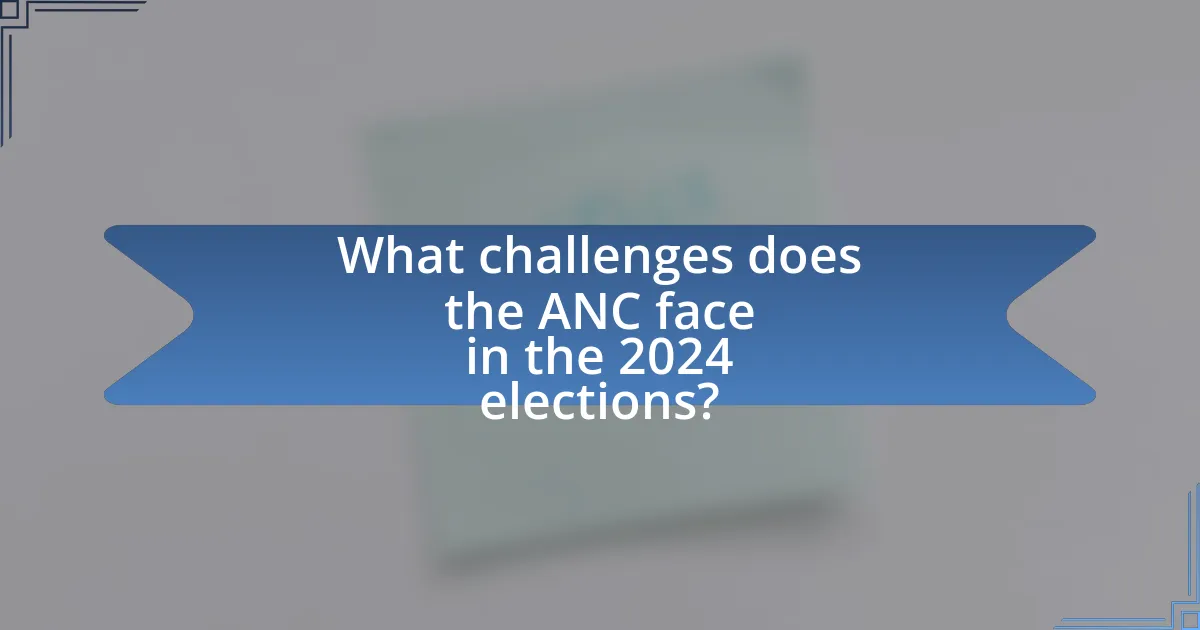
What challenges does the ANC face in the 2024 elections?
The African National Congress (ANC) faces significant challenges in the 2024 elections, primarily stemming from internal divisions, declining voter support, and issues of governance. Internal divisions have been exacerbated by factionalism within the party, leading to a lack of unified strategy and messaging. Declining voter support is evidenced by recent electoral results, where the ANC’s share of the vote has decreased, reflecting growing discontent among the electorate regarding service delivery and corruption. Additionally, governance issues, including high unemployment rates and economic instability, further undermine the ANC’s position, as these factors contribute to public dissatisfaction and erode trust in the party’s ability to lead effectively.
How does public perception impact the ANC’s election strategy?
Public perception significantly impacts the ANC’s election strategy by influencing voter behavior and party image. The ANC must adapt its messaging and policies to align with public sentiment, as seen in the 2019 elections where declining trust in the party led to a loss of support. Surveys indicate that issues such as corruption and service delivery directly affect how voters perceive the ANC, prompting the party to focus on transparency and accountability in its campaign. This strategic alignment with public concerns is essential for the ANC to regain voter confidence and improve electoral outcomes.
What are the current public sentiments towards the ANC?
Current public sentiments towards the ANC are largely negative, with significant dissatisfaction regarding governance and service delivery. Recent surveys indicate that the ANC’s approval ratings have dropped to around 30%, reflecting widespread frustration over issues such as corruption, unemployment, and economic instability. For instance, a 2023 poll by the South African Institute of Race Relations highlighted that 65% of respondents believe the ANC has failed to address critical socio-economic challenges, further underscoring the party’s declining support among the electorate.
How can the ANC address negative perceptions effectively?
The ANC can address negative perceptions effectively by implementing transparent communication strategies and engaging directly with communities. By actively sharing information about their policies, successes, and challenges, the ANC can counter misinformation and build trust. For instance, the ANC’s use of social media platforms to disseminate factual updates and respond to public concerns has shown potential in improving public perception. Additionally, community outreach programs that involve local leaders can foster a sense of accountability and connection, as evidenced by initiatives that have successfully increased voter engagement in previous elections.
What external factors could influence the ANC’s election outcomes?
External factors that could influence the ANC’s election outcomes include economic conditions, public sentiment, and international relations. Economic conditions, such as unemployment rates and inflation, directly affect voter perceptions of the ANC’s governance. For instance, South Africa’s unemployment rate was around 34% in 2023, which could lead to voter dissatisfaction. Public sentiment, shaped by social issues like crime and service delivery, also plays a crucial role; surveys indicate that citizens prioritize safety and basic services, impacting their voting decisions. Additionally, international relations, particularly trade agreements and foreign investment, can sway public opinion on the ANC’s effectiveness in fostering economic growth. These factors collectively create a dynamic environment that can significantly alter the ANC’s electoral prospects.
How do economic conditions affect voter behavior?
Economic conditions significantly influence voter behavior by shaping perceptions of government performance and individual financial security. When the economy is strong, voters tend to support incumbents, believing that their policies have contributed to prosperity; for instance, during the 2016 U.S. presidential election, economic growth was a key factor in voter support for the incumbent party. Conversely, in times of economic downturn, such as the 2008 financial crisis, voters often shift their support to opposition parties, seeking change in leadership to address their grievances. This pattern is supported by research indicating that economic indicators, such as unemployment rates and inflation, directly correlate with electoral outcomes, as voters prioritize their economic well-being when making decisions at the polls.
What role do opposition parties play in shaping the election landscape?
Opposition parties play a crucial role in shaping the election landscape by providing alternative viewpoints and policies that challenge the ruling party’s agenda. They stimulate political debate, encourage voter engagement, and hold the government accountable, which can influence public opinion and voter turnout. For instance, in the 2019 South African elections, opposition parties like the Democratic Alliance and the Economic Freedom Fighters highlighted issues such as corruption and service delivery, which resonated with voters and impacted the electoral outcomes. This dynamic fosters a competitive political environment, essential for a healthy democracy.
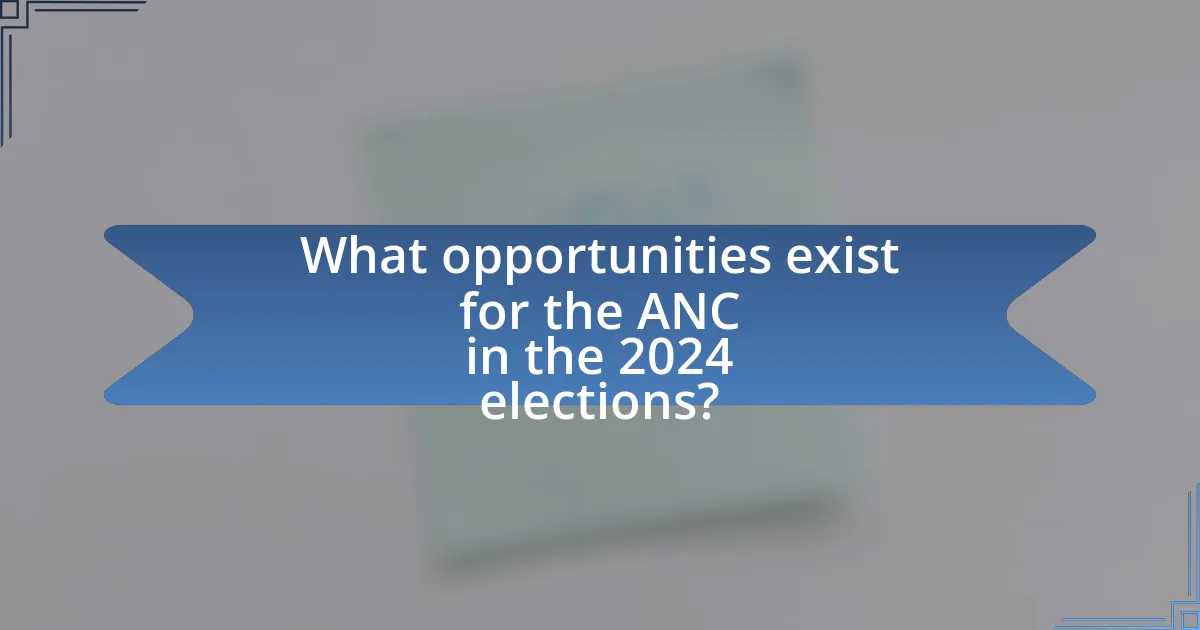
What opportunities exist for the ANC in the 2024 elections?
The African National Congress (ANC) has several opportunities in the 2024 elections, primarily centered around addressing key voter concerns and leveraging its historical legacy. The ANC can capitalize on its established support base, which remains significant despite recent electoral challenges, by focusing on economic recovery and job creation initiatives. For instance, the government’s ongoing efforts to combat unemployment, which stood at 34% in 2023, can resonate with voters seeking stability and growth. Additionally, the ANC can enhance its appeal by promoting social programs aimed at poverty alleviation and improving public services, which are critical issues for many South Africans. By effectively communicating its achievements and future plans, the ANC can potentially regain lost support and strengthen its position in the upcoming elections.
How can the ANC leverage its strengths to gain voter support?
The ANC can leverage its historical legacy and established grassroots networks to gain voter support. By emphasizing its role in the anti-apartheid struggle and showcasing achievements in social development, the ANC can resonate with voters who value historical significance and progress. For instance, the ANC’s implementation of policies that have improved access to education and healthcare can be highlighted to demonstrate its commitment to social justice. Additionally, the party can utilize its extensive local structures to engage directly with communities, addressing their specific needs and concerns, thereby fostering trust and loyalty among voters.
What unique advantages does the ANC have over its competitors?
The African National Congress (ANC) possesses unique advantages over its competitors, primarily its historical legacy and established political infrastructure. The ANC’s long-standing association with the anti-apartheid struggle has fostered deep-rooted loyalty among its supporters, which is a significant asset in mobilizing voters. Additionally, the ANC has a well-organized party structure that enables effective grassroots campaigning and resource allocation, allowing it to maintain a strong presence in both urban and rural areas. This organizational strength is evidenced by its extensive network of branches and local leadership, which facilitates community engagement and voter outreach.
How can the ANC capitalize on emerging trends in voter engagement?
The ANC can capitalize on emerging trends in voter engagement by leveraging digital platforms and social media to reach younger voters. Research indicates that over 70% of young voters in South Africa engage with political content online, making digital outreach essential for mobilization. By utilizing targeted social media campaigns and interactive online forums, the ANC can foster a sense of community and encourage participation in the electoral process. Additionally, incorporating data analytics to understand voter preferences and behaviors can enhance the effectiveness of their engagement strategies, as evidenced by successful campaigns in other democracies that have utilized similar approaches.
What strategies can the ANC implement to maximize its opportunities?
The ANC can implement strategies such as enhancing grassroots engagement, leveraging digital platforms for outreach, and focusing on policy transparency to maximize its opportunities. By strengthening connections with local communities, the ANC can better understand voter needs and concerns, which is crucial for building trust and support. Utilizing digital platforms allows the ANC to reach a broader audience, particularly younger voters, and facilitates real-time communication. Additionally, prioritizing transparency in policy-making can enhance credibility and attract undecided voters, as evidenced by studies showing that transparency correlates with increased public trust in political entities.
How can coalition-building enhance the ANC’s electoral prospects?
Coalition-building can enhance the ANC’s electoral prospects by broadening its support base and increasing its chances of winning a majority in elections. By forming alliances with smaller parties, the ANC can attract voters who may feel disenfranchised or disillusioned with the current political landscape, thereby increasing voter turnout and engagement. Historical examples, such as the ANC’s coalition with the Congress of the People in 2009, demonstrate that strategic partnerships can lead to improved electoral outcomes. Additionally, coalition-building can facilitate resource sharing and collaborative campaigning, which can amplify the ANC’s message and reach.
What innovative campaign tactics could the ANC adopt for 2024?
The ANC could adopt digital grassroots mobilization as an innovative campaign tactic for 2024. This approach involves leveraging social media platforms to engage directly with voters, utilizing targeted messaging and community-driven content to foster a sense of belonging and urgency. Historical data shows that in the 2019 elections, social media played a crucial role in voter engagement, with 60% of young voters using these platforms for political information. By creating interactive campaigns that encourage user-generated content, the ANC can enhance voter participation and address local issues effectively, thereby increasing their appeal among diverse demographics.
What practical steps can the ANC take to ensure a successful campaign?
The ANC can ensure a successful campaign by focusing on grassroots mobilization, effective communication, and addressing key voter concerns. Grassroots mobilization involves engaging local communities through door-to-door campaigns and community meetings, which can increase voter turnout and support. Effective communication includes utilizing social media platforms to reach younger voters and disseminate campaign messages clearly and consistently. Addressing key voter concerns, such as unemployment and service delivery, can resonate with the electorate, as evidenced by the ANC’s historical focus on these issues, which have been pivotal in previous elections. By implementing these strategies, the ANC can enhance its chances of success in the 2024 elections.
